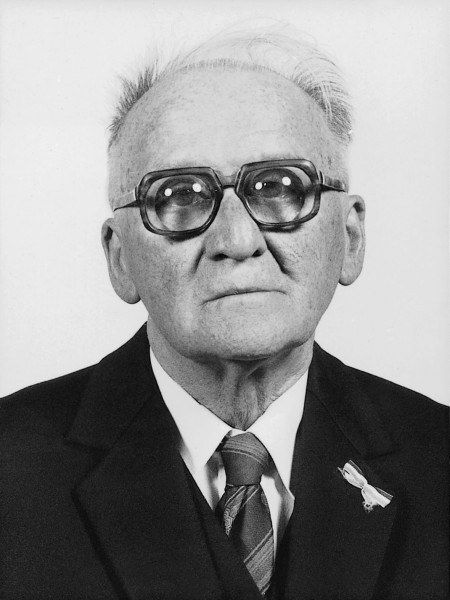
10 September 1914, Budapest – 18 March 1998, Budapest
It is hard to write about people who cannot be docketed. I was twenty-three years old when I started my organ studies with him – I don't think I could be as encouraging for a beginner as he was with me then. I had lessons with him every other week in different churches following the evening services. He played in several churches simultaneously, at the Franciscans' for almost seventy years. He told me later that he was the organist of the synagogue in Dohány Street for a long time, as well. I heard out his playing many times in order not to be late.
As I also had been playing in churches since the age of fifteen, I knew all the hymns, though these melodies sounded in a different way, enviably beautifully. It was a great experience to listen to his harmonization, and had an incentive impact on rethinking of my weary playing of the score.
I was amazed by his unbroken optimism, especially after being partially informed about his family background. He lived among tragedies and ceaseless painful circumstances. It was only his wife who meant a safe point in his life. Most people must have given up or would have become indifferent, torn. One cannot look into others' soul or heart but in his case reasons and explanations can be many sentences from the Scriptures: '...do not worry the birds in the sky...' Sometimes he seemed to be an old-fashioned, anachronistic guy, as he kissed hands of women, as he told not any insulting comments about anybody and as he was consolation for people being said about every bits and pieces of issues, himself being broken, as well. He was separated by few or none steps from his students. Somewhere in his heart he remained a child, who always believes in the good part of others and forgets the hurtful and bad things easily. He was a man of appeasement – according to many others he never stood really hard for anything – though any polarized and one-track justice was far from him. He did the same as a teacher: showed different ways, possibilities and solutions leaving the choice to the student. (That way he ‘inherited' probably from his teacher, Zalánfy with whom he studied at the Academy of Music between 1933-1936 and 1938-1941.)
Musical and performing taste changed a lot during his long life. He was interested in everything new and beyond the age of sixty he travelled to Belgium to one of his colleagues not too much older than him, to hear the new performing style that had been prevalent for a long time in the West. He mentioned frequently: ‘I learn from my students, as well.' I heard him performing several times during our acquaintance of twenty years. Probably he compiled programs of too difficult works. We admired whether what time could he practice them. The recital hall was not his world. To be at the stage at a high level for a long time he would have needed no little selfishness: to say ‘no' continuously for any disturbing moments for all the hands being in a need of help. He was not able to do so, and also he did not want to refuse anybody. His world was the moment of inspiration, the improvisation. Lyre and energy coexisted. He was a real manifestation of the church organist: humility and professional grandiosity. He accepted proudly the title of being a cantor that is used pejoratively here. Despite his poor eyes and unstable legs he was on his path tirelessly: the triangle of teaching, Mass services and family problems. He appeared at the Academy of Music daily, either he had a lesson or not. Of course he had lessons every day, he adapted to his students desires as far as possible, he just wanted to be at the Mass in time. Lots of people consider themselves as Gergely-students, and not only from the Academy of Music. He had time for everybody, sat in the audience at every student recitals, and stood there for doing registration without a word if he was asked for that. And he had a good word and encouragement for everybody.
What could we learned from him? Primarily the love of music, music-making, Mass service, and the raison d'etre of the individual creative ideas. The loyalty of profession the appreciation of colleagues. Of course profession, too, the way of doing that, but these become a little re-evaluated over a certain time, though he had not any advice that we had to deny. He followed the careers of his former students and was glad if they were ‘on the right way'. His deep knowledge of the instrument's literature was enthralling. It turned out at the methodology courses that he knew and played some works of the composers of not first rank who had been rediscovered those days. With an awesome memory he could recall the features of some hundred instruments. His taste was closer perhaps to the French spirit. He himself resembled Cesar Franck from several point of views, whom was called the same way ‘uncle' by his students. He was an enthusiastic Reger-player and fan in one. He was in personal connection with the greatest ‘legends': Messiaen, Dupré. Due to his friendly, spirited and entertaining nature all European organ teachers could call him their friend.
Nowadays in a rapid and violent world one could say at times: a man like him may even not exist. We who knew him can say that he was like that; he lived and showed the evangelical love.
R. I.


